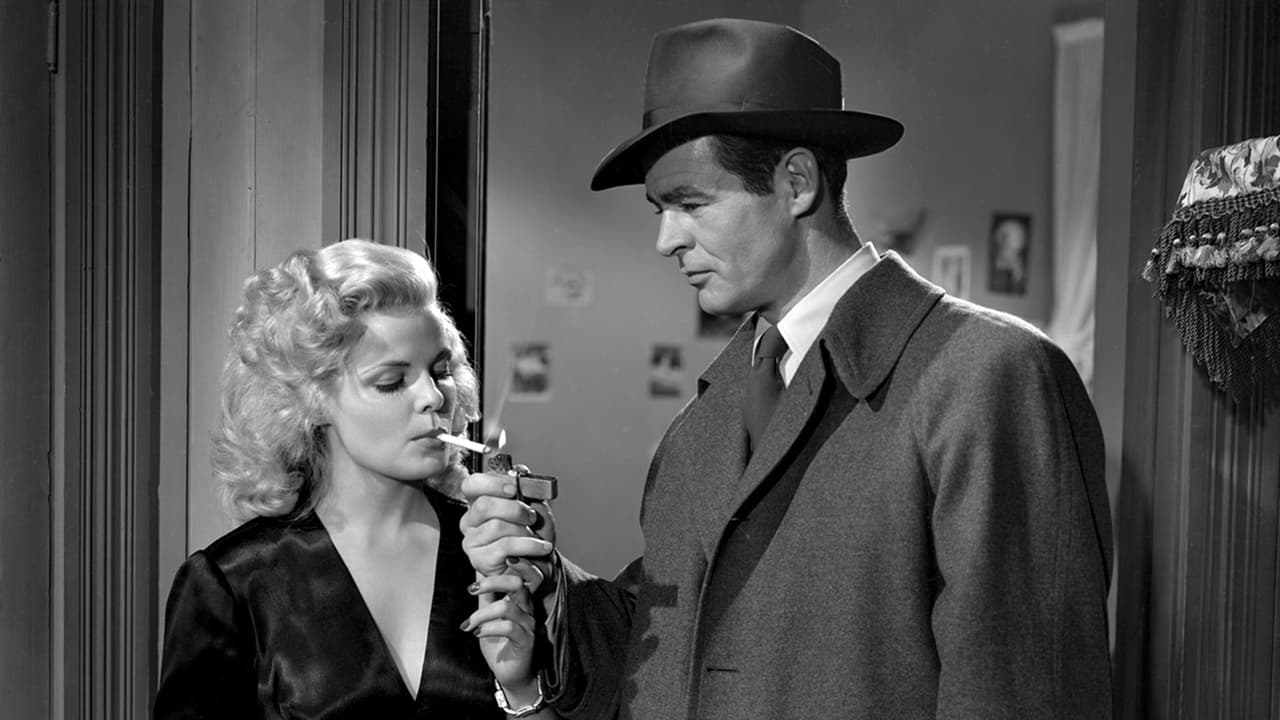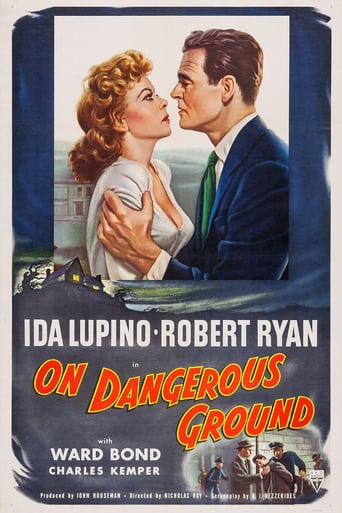Tacticalin
An absolute waste of money
Kidskycom
It's funny watching the elements come together in this complicated scam. On one hand, the set-up isn't quite as complex as it seems, but there's an easy sense of fun in every exchange.
Brendon Jones
It’s fine. It's literally the definition of a fine movie. You’ve seen it before, you know every beat and outcome before the characters even do. Only question is how much escapism you’re looking for.
cheadwrites
My TV was still tuned to TCM from the night before, so when I hit the remote to watch the morning news, the first image I had was of what I thought was a gritty, gumshoe tale. A glimpse of Robert Ryan kept me from switching channels, and when I clicked for more info on the remote and saw the summary, and the name: Ida Lupino, there was no turning away. The most compelling parts of this film is the story's attempt (probably maintained from the novel upon which the film is based) to explain the hardness and inhumanity which can occur when you're a cop. Jaded, and now dangerous, cop Jim Wilson (Robert Ryan) doesn't have an outlet to balance the harshness of the tough, city streets he prowls everyday. Even his fellow cops point out that he needs to find a way not to take his work home with him every night. When his anger spills over one too many times, he's sent off to help on a case away from the mean streets. Where he meets, and falls in love with a blind woman (Ida Lupino). Lupino is uncredited as a director but you can see her deft touch in the scenes where she navigates domesticity as a blind woman. The second thing to become enamored with in this film is the music. Bernard Herrmann's musical themes can be heard all over this film, but especially the rural scenes which invoke North by Northwest, Psycho, and the haunting strains of Marnie. In this film, Herrmann establishes some of the themes he liberally borrows from in later projects, in particular his TV work on westerns like Have Gun Will Travel. But this film, released in 1952, was obviously influenced by his work the year before on one of my favorite films, The Day the Earth Stood Still. By the way, it's easy to imagine that the Master, Hitchcock, may have borrowed a few cinematic techniques from On Dangerous Ground director, Nicholas Ray, in the mountain chase scene. Imagine Mount Rushmore instead of the snowy, rural mountain in this film, and you'll see what I mean.
jeffhaller125
This is unlike any film I have ever seen. It actually plays like two different movies and if you see them separately, each feels complete. The city part is probably the most honest and gripping depiction of the police force and its darkness. The film then does an about face in the country, in an entirely different rhythm that is equally dark. It is a character study in which all of the characters earn our sympathy. We can't help but understand why they behave as they do. I often think of the 1950s as a very weak decade for American film. This one stands among the best. Had the French made this movie, it would be talked about as a masterpiece.I heard that the ending was dramatically changed from what was originally intended. The studio made the right decision. The audience deserves a happy ending to this almost gruesome tale.
SnoopyStyle
Police detective Jim Wilson (Robert Ryan) is tired of the city. He is deteriorating and starts beating up suspects. Capt. Brawley sends him upstate to investigate the murder of a young girl. He joins the father of the girl Walter Brent who only wants revenge in a manhunt. They pursue him to an isolated home and visually impaired Mary Malden (Ida Lupino). While Walter goes looking for the killer, Mary tells Jim that she lives with her brother Danny and he's been away for the last 2 days. She suspects Danny and begs Jim to take him in alive.I love the mix of noir and hard-boiled crime drama in this movie. It starts off with a urban city police drama. Then it transitions into an austere isolated thriller. I like the car drive where the landscape literally transitions. The cross current of motivations in that lonely home is intense. The wrap-up after the climax does run on too long. Director Nicholas Ray wanted a shorter darker ending but studio interference does add a clunky happy ending.
Michael O'Keefe
Also known as DARK HIGHWAY, this thriller is directed by Nicholas Ray. A bitter and jaded detective, Jim Wilson(Robert Ryan), has roughed up enough suspects in the hard city streets and his boss sends him upstate to investigate the murder of a young girl in the snow-blanketed countryside. Her father, Walter Brent(Ward Bond), is devastated and tries to lead a heated search for an allusive killer. Wilson informs the local authorities that he is taking over the investigation, but Brent doesn't think a city cop can do the job. The detective, with the girl's father crowding him all the way, follows tracks to the home of a blind woman, Mary Malden(Ida Lupino). She takes care of her mentally challenged brother Danny(Sumner Williams), who is a logical suspect in the murder. Mary tries to convince the hardened Wilson to ease up and spare her brother's life.Miss Lupino is not credited for her hand in helping with the direction of this movie, in which she gives a stellar performance. Rounding out the cast: Ed Begley, Ian Wolfe, Frank Ferguson and Charles Kemper. This RKO Radio Pictures feature was filmed in Colorado and is aided with an atmospheric score by Bernard Herrman.

